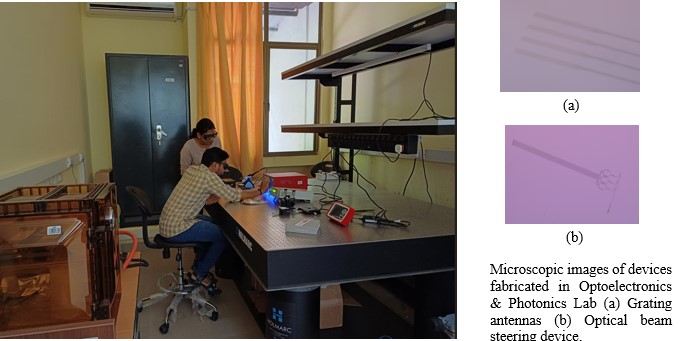- 8:37 PM, Thursday, 24 Jul 2025


The laboratories/research facilities are established under Department of Avionics Engineering. Various experimental setups are developed in these labs to crater to the need of undergraduate and post graduate programs. In addition, several research facilities are also developed to support the research activities under the Department
The Soldering and Wiring Lab provides hands-on training to B.Tech students in essential electronics skills, focusing on soldering techniques, wire harnessing, and circuit assembly. Students are trained to solder various types of components on PCB to build functional circuits. Basic training on designing and implementation of an electrical power distribution system, covering different aspects like the selection of components, sizing of conductors etc. is imparted in this lab. In general, this lab equips the students with practical knowledge required for building reliable electronic systems used in engineering projects.
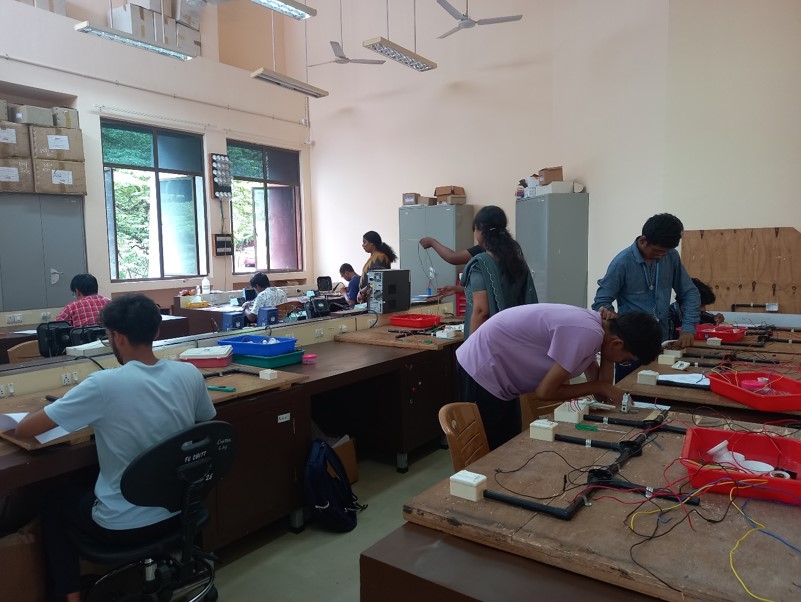
Overview
An essential part of the engineering curriculum at IIST is the Control Systems Lab, which focuses on the real-world implementation of control theory and systems engineering. Students can gain practical experience in building, evaluating, and implementing control systems in this lab. Control systems are essential in many fields, such as industrial automation, robotics, and aerospace.
Goals
The Control Systems Laboratory's main goals are to:
Tools and Equipment:
The laboratory is furnished with an array of instruments and technologies, comprising:
Major equipments in this lab includes
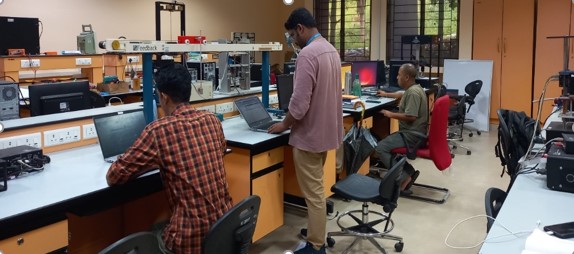
The Systems and Networks Lab (SysNet Lab) at the Department of Avionics, Indian Institute of Space Science and Technology, is a research laboratory specializing in networked systems as well as next-generation computer networks. The lab’s key research areas include Mobile Ad-hoc Networks (MANETs), Wireless Mesh Networks (WMNs), Wireless Sensor Networks (WSNs), Delay Tolerant Networks (DTNs), Software Defined Networks (SDNs), Internet of Things (IoT), satellite networking, Satellite Edge Computing (SEC), 5G/6G satellite integration, 5G/6G testbed development, CubeSat development, Space-Based Hosting Service (SBHS), quantum computing, Brain-Computer Interface (BCI), complex networks, and graph signal processing..
5G/6G Satellite Experiments
The 5G testbed is based on the SrSRAN and Open5GS framework and focuses on the development and integration of 5G/6G technologies. Further, simulation testbed enables experimentation with low-latency communications, as well as testing satellite-terrestrial network integration, handover, and edge computing capabilities.
Brain-Computer Interface (BCI) testbed
The BCI testbed creates BCI datasets for various Indian languages, utilizing OpenBCI hardware. These datasets are used for research in multilingual BCI systems and the development of machine learning and deep learning algorithms that recognize and process brain signals for neuromuscular disorders.
Space-Based Hosting Service (SBHS) hardware and software testbed
The SBHS testbeds provide a platform for deploying and testing databases on satellite and high-altitude balloon platforms. This enables researchers to explore novel architectures and communication protocols for space-based hosting services and edge computing services for remote and rural regions of the world.
Wireless Mesh Network testbed
Additionally, the lab has set up the Wireless Mesh Network (WMN) testbed, "IIST MeshNet," covering D2 and D4, to study the behavior of wireless multihop networks. SDN capabilities have been integrated into the mesh routers for granular network control and enhanced performance analysis.
The lab is equipped with a variety of hardware and software tools, including:
Hardware
Software
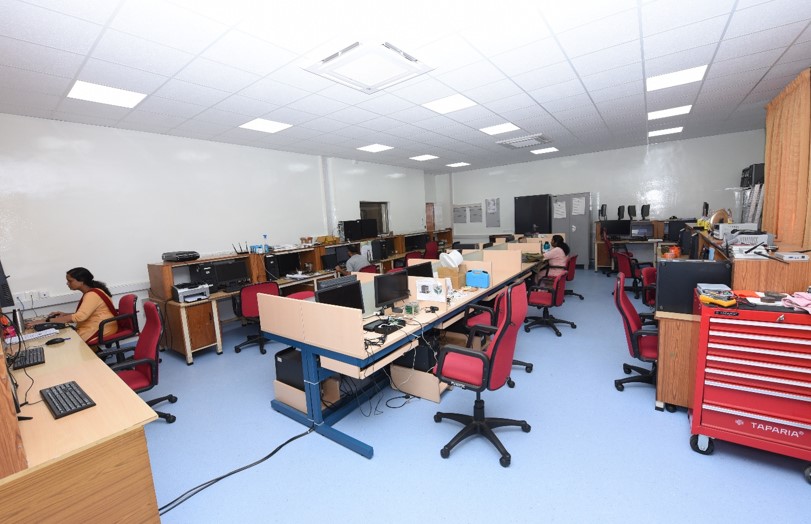
The Advanced Power Electronics Lab at the Indian Institute of Space Science and Technology (IIST) provides students with a platform to explore and gain hands-on experience with the latest developments in power electronics. The lab offers students an opportunity to engage in practical experiments, such as designing and implementing key power converter topologies like Buck, Boost, Flyback. By working in this advanced lab, students at IIST are equipped with the technical skills, practical knowledge, and innovative thinking required to succeed in this dynamic industry.
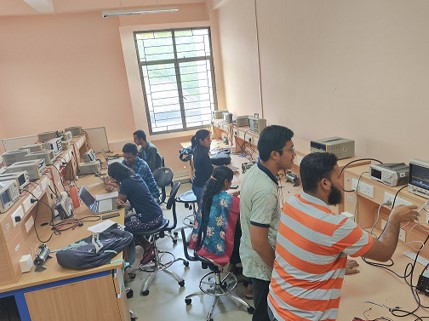
E-CAD Lab E-CAD lab in the department that deals with computed aided design of various analog circuit and digital circuits, PCB design tools, Network design tools and simulation software such as MATLAB, Verilog, Cad software such as vivado, LT spice etc. Students are familiarized with various state of the art software packages required for basic and advanced circuit design.
This lab is being utilized by UG/PG/Projects students.
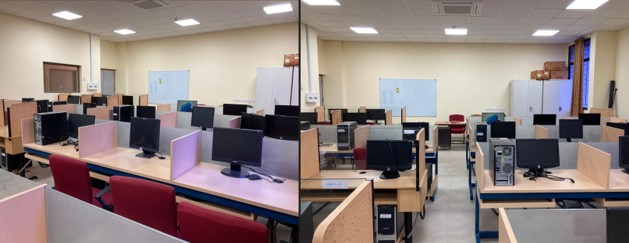
This research lab focusses on designing and implementing efficient hardware accelerators for signal/image processing techniques and deploying it for real time applications. Scholars who are doing research in VLSI signal processing are utilizing this lab for the research purpose which is furnished with most of the latest Digital IC design tools, FPGA design tools and related software required for simulations and comparisons.
Major equipments
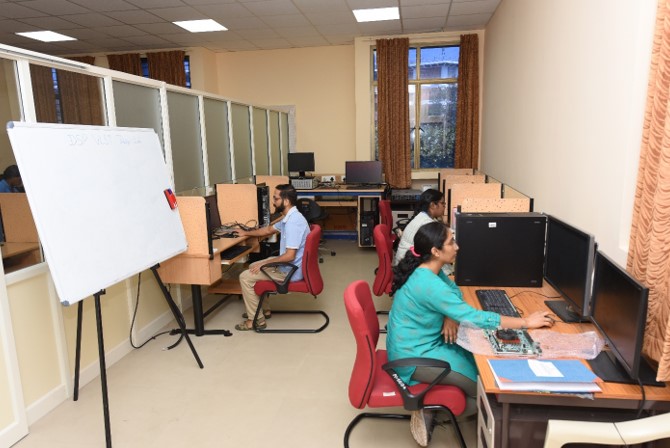
This lab was established to support the Post Graduate program VLSI and Microsystems introduced in the year 2013 and research activities in the areas of VLSI. Modelling, design and simulation tools for MEMS devices, Micro/Nanoelectronics devices and systems. (High end workstations, Coventorware and MEMS+ from Coventor, Silvaco ATLAS and ATHENA TCAD,Sentaures TCAD 3D Process and Device TCAD from Synopsis,COMSOL Multiphysics etc.)
Major equipments
Analog and Digital IC design Tools from Cadence, Synopsys, Mentor Graphics, FPGA design tools and boards, MEMS software, TCAD software, Logic Analyzer, High end PCs.
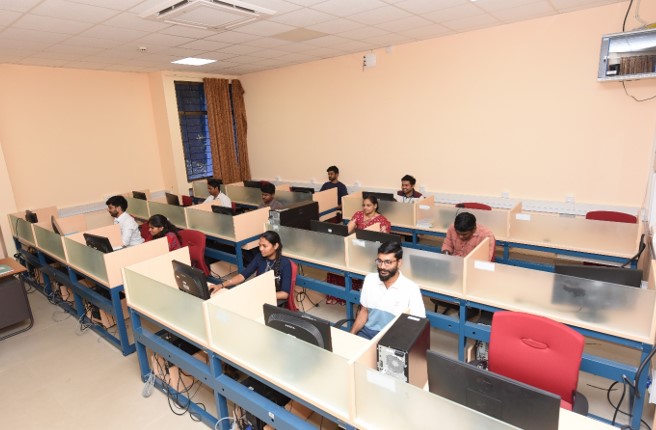
Digital Signal Processing Lab is developed for UG, PG and Research Students to carry out experiments in 1D/2D signal processing to perform both simulation and real time signal processing task.
Major equipments
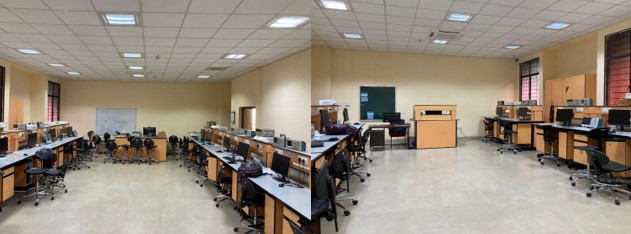
Digital electronics and Microprocessor Lab is developed for UG, and PG to carry out hands on experiments in Digital circuits and to learn C programs to be program in microprocessor/microcontroller boards to get knowledge in microprocessor/microcontroller architecture, programming and its applications.
Major equipments

Analog electronics form the backbone of various modern electronic devices and systems. For undergraduate engineering students, particularly those pursuing degrees in Electronics Engineering (EEE) or related fields, a solid understanding of analog electronics is crucial. The Analog Electronics Lab provides a hands-on learning experience that complements theoretical knowledge, fostering a deeper understanding of the subject. The lab enables students to apply theoretical concepts learned in lectures. Students gain proficiency in using various laboratory instruments such as oscilloscopes, function generators, multimeters, and power supplies. They learn to design, build, and test analog circuits, fostering skills in troubleshooting and problem-solving.
Existing Hardware Tools
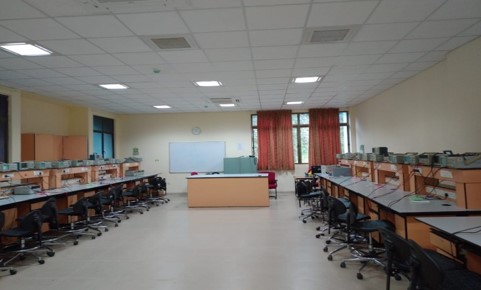
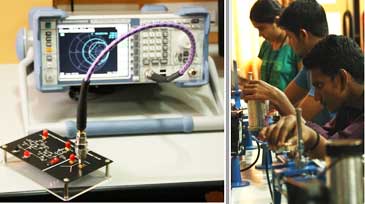
RF and Microwave Lab of the department is equipped with various facilities to perform both classical and modern experiments. Apart from Waveguide test-bench based experiments, facilities like transmission line trainer kit, antenna radiation pattern measurement set up, characterization of microwave network and antennas using spectrum and network analyzer are existing in this lab. The lab is also equipped with various advanced electromagnetic CAD softwares like HFSS, CST, Feko, ADS etc. extremely useful for state of the art research in this domain.
Major facilities of this lab includes:
Instrumentation and Measurement Laboratory is well-equipped for research and education in the field of sensors and associated measurement schemes, analog signal processing and virtual, bio and digital instrumentation. It houses extensive experimental and simulation facilities (important facilities are given below) for instrumentation-related laboratory courses of undergraduate (avionics and engineering physics) students of IIST. Research projects related to design and implementation and analysis of magnetic sensors and interface electronics, direct-digitizers, advanced measurement circuits, biomedical electronics and embedded systems are also carried out in this laboratory
Some of the instruments present in the lab are listed below:
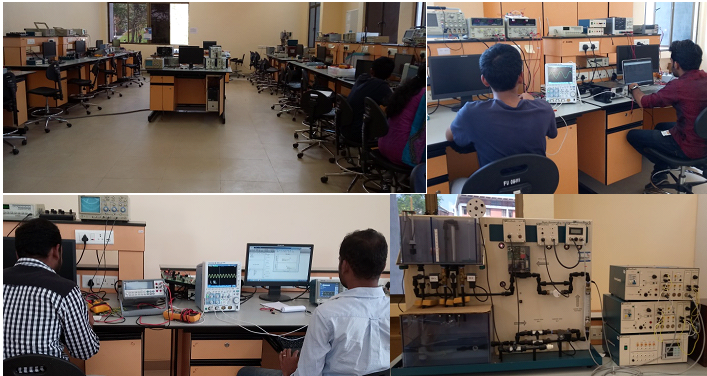
This lab was setup to provide hands-on training in the field of navigation Systems and sensors. Various experiments like calibration of inertial sensors such as servo accelerometers, MEMS accelerometers, Dynamically Tuned Gyroscopes, MEMS gyroscopes are performed in the lab. Navigation system level tests such as rate test, multi-position test, all attitude test, Hardware in loop tests are planned to be carried out in this lab. In addition, provision for carrying out the simulation of inertial navigation system are provided to impart training on different navigation algorithms in different navigation frames. Major equipments such as servo accelerometer check-out system, DTG check-out system, 2-axis Angular Motion Simulation set up, 3-axis dividing head setup are available in the lab. Further, Navigation System packages which are used in the PSLV, GSLV mark-3 are available for demonstration in the lab. Significantly, the lab has one of the first few deployed IRNSS receivers across the country, and two portable IRNSS receivers and ISRO-SAC in-house developed IRNSS simulator. This gives focuss on satellite navigation receiver design for GPS, IRNSS(NAVIC) etc.
The major objectives of the Digital Communication Lab are to provide students with a comprehensive understanding of fundamental and advanced communication concepts through hands-on experimentation. For undergraduate students, the lab aims to impart practical knowledge of modulation and demodulation techniques using kits and breadboards, bridging the gap between theory and practice. For postgraduate students, the focus is on exploring and analyzing advanced 4G communication systems and other modern technologies. The lab also seeks to develop practical skills in designing, implementing, and testing communication systems using sophisticated tools and software such as MATLAB, Python, and SDR/USRP. Expected outcomes include enhanced understanding of communication principles, proficiency in advanced tools and technologies, valuable research contributions in signal processing and radar systems, and practical experience that prepares students for careers in the communications field.
Major Equipment:
These devices enable comprehensive exploration of modulation and demodulation techniques, as well as advanced studies in 4G communication systems, thereby enriching the lab's research and educational programs.
Existing Software Tools:
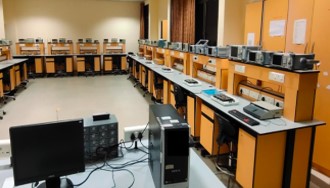
The Advanced Wireless Communication Laboratory specializes in conducting research in the broad area of wireless communications, with a focus on signal processing within the physical layer. The primary research activities include:
This lab is equipped with state-of-the-art equipment and development tools designed for real-time signal processing and communication. The lab's comprehensive setup enables advanced research and development, fostering innovations that push the boundaries of current wireless communication technology.

Existing Software Tools:
Major Objectives/Outcomes of the Lab:
The Advanced Wireless Communication Laboratory specializes in cutting-edge research in wireless communications, emphasizing signal processing within the physical layer. Its primary research activities span several critical areas, including Signal Processing for Wireless Communication Systems, which focuses on enhancing the efficiency and performance of wireless networks. The lab also explores Cognitive Radio and Dynamic Resource Allocation, which aim to optimize the use of available spectrum. Additionally, the team works on Full-Duplex Radio and Hardware-Based Modeling and Signal Processing Techniques, seeking to enable simultaneous transmission and reception on the same frequency. Software Radio and USRP Experimental Implementation are also key areas of focus, facilitating flexible and reconfigurable communication systems. The lab's research in Hybrid Beamforming for mmWave Communication aims to improve high-frequency communication capabilities, while their work on OFDM/OTFS Systems seeks to integrate radar and communication functions. Furthermore, the lab delves into MIMO OFDM Systems, focusing on Channel Estimation and Decoding, and advances in Radar Signal Processing to enhance the accuracy and reliability of radar systems.
The Department of Avionics has developed this lab for UG, PG, and research graduate students. This lab consists of ten entry-level workstations, a thermal imaging camera, stereo vision camera, and a 4 GigE vision high-speed camera for various image processing related activities. The lab uses both open-source platforms as well as licensed application software such as MATLAB and Visual Studio Professional 2012 for various lab-related activities. Students use this facility for labs in courses like Digital Image Processing, Video Processing, Pattern Recognition, and Computer Vision. UG and PG students also use this facility to do their final year projects in various areas such as image retrieval, speech processing, computer vision, image and video processing, soft computing, and machine learning.
Our lab is actively engaged in various research projects utilizing advanced machine learning techniques. Some of the key areas of focus include:
Epileptic Seizure Detection: Our research involves the development of deep learning models for the detection of epileptic seizures through time series analysis. By employing spatial modeling techniques using graph neural networks, we aim to enhance the accuracy and efficiency of seizure detection, contributing to improved patient outcomes.
The Department of Avionics is establishing a center of excellence in Virtual Reality for various space and scientific applications. The development is planned in three phases. The first phase consists of a desktop VR lab, which includes a high-end workstation with the latest graphic capabilities, 3D monitors, 3D vision-pro glasses, and application software such as Vizard, Blender, Google Sketch, Adobe Master Suite collection, 3ds Max, and Maya. The facility will be further upgraded by creating an immersive studio-type Virtual Reality center in phases 2 and 3. The proposed facility will be supported by advanced haptic devices, sensors, and force feedback systems for various real-life applications such as navigation, fly-throughs, etc. Some of the objectives for establishing the center of excellence in Virtual Reality at the Department of Avionics, IIST Trivandrum, are as follows:
General Research Areas:
Disaster modeling and simulation, 3D VR visualization of compounds and chemicals for theoretical and nonlinear dynamical studies. Developing VR teaching simulations for better understanding of concepts in different key subjects of Avionics, aerospace, physical science, and humanities.
Every year, UG/PG students carry out their internship projects and B.Tech projects with existing facilities. Work is underway to procure several Virtual Reality peripherals to augment the existing Desktop Virtual Reality setup. These devices will be capable of being used with the Virtual Reality software development toolkit, WorldViz Vizard. They will be configured to seamlessly integrate with the existing setup and can be driven from the workstations present in the lab. As of now, one set of Virtual Reality data gloves for interaction with objects in the virtual world has been procured and added to existing facilities.

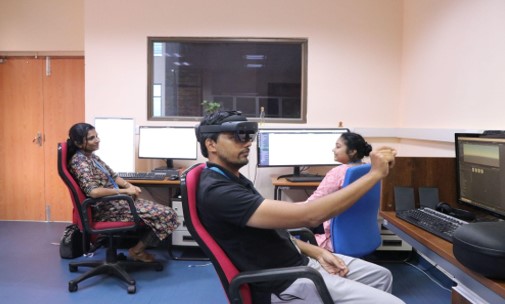
Communication Networks Lab (ComNet Lab) is a research laboratory in the Department of Avionics at the Indian Institute of Space Science and Technology. The lab focuses on research in the broad area of communication networks, with major research areas including mathematical performance analysis, optimization, and the design of communication and computing algorithms.
Core competencies include:
The research lab has enabled forty-one B.Tech and thirteen M.Tech students to complete their projects. Currently, one B.Tech, two M.Tech, and five PhD students are actively engaged in research in areas such as network design for time-slotted networks, network design for semantic communication, performance optimization of communication networks, and optimal control and co-design of networked control systems.
The ComNet Lab has contributed to around thirty-two conference publications in prestigious conferences in the area of communication systems, including COMSNETS, NCC, WiOpt, and ICC. Additionally, eleven journal publications have been produced by the lab's researchers in IEEE Transactions on Information Theory, IEEE Communications Letters, IEEE Journal on Selected Areas in Communications, IEEE Networking Letters, and IEEE Transactions on Instrumentation and Measurement. The members of the lab and the principal investigator have been involved in multiple projects.
Following are the completed Projects:
Ongoing Projects:

The ASIC Design and Characterization Lab focuses its research on designing and developing ICs for analog, mixed-signal, and RF applications. We attempt to solve analog/RF problems in various applications and aim to develop solutions that advance the frontiers of IC design technology. This lab is also actively engaged in the mission to indigenize IC designs in India, in collaboration with different centers of research under the Department of Space, India. In addition to work on IC design, we also focus on MMICs and board-level RF designs for specific applications. This lab contributes to the Small Spacecraft and Payloads Centre (SSPACE) of IIST by developing electronic modules and boards for different payloads and nanosatellites.
Major facilities of this lab include:
Design Facilities
High-performance computers and software like Cadence, Mentor Graphics, Synopsys, and ADS for the design and verification of analog, mixed-signal, and RF ICs.
Millimeter-wave IC Testing Equipment
Analog & Mixed-Signal Testing Equipment
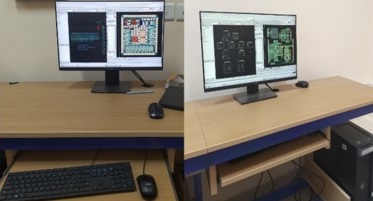

5G Use Cases Lab is under the “100 5G Use Cases Labs Initiative" of Government of India. Prime Minister Shri Narendra Modi formally awarded the 5G Use Cases Lab to IIST during the inauguration of Indian Mobile Congress 2023 (IMC-2023) in New Delhi. This initiative aims to foster expertise and active participation in 5G and subsequent technologies among students, educators, researchers, and the startup ecosystem. 5G Use Cases Labs program will be overseen by the Department of Telecommunications (DoT), Government of India.
The state-of-the-art 5G Use Cases Labs will be equipped with 5G cellular infrastructure (mid-band) SA, 5G SIMs, Dongles, IoT Gateway, Router, Application Server, and a comprehensive management dashboard. It consists of compact 5G networks and use case devices such as drones, AR-VR test kit, startup testing kit, to develop use case applications related to education, health, agriculture and other sectors. The lab can act as testing cum breeding grounds for upskilling innovations such as students and startups and aid in developing use case applications according to India’s needs.
Engineering institutions in and around south India can collaborate with IIST in order to utilise the 5G Use Cases Labs for research and education. The 5G use cases labs also promise to seamlessly integrate IIST into the expansive global digital development ecosystem. This can help to design, develop and deploy 5G & 6G technologies and also will enable high-end research in 5G and upcoming 6G technologies. This allows faculty and students to participate in international collaborations, joint research projects, and publications. It also opens avenues for partnerships with industry leaders, research institutions, and startups worldwide.
Students will gain hands-on experience with advanced 5G infrastructure, essential for understanding and developing 5G and future 6G technologies. This enhances their skills in areas like network deployment, data management, IoT, and AR/VR applications, making them highly employable in the tech-driven job market. This enables students to launch startup ventures focused on 5G technologies, contributing to India’s growing startup ecosystem.
The lab's work is divided into two primary research areas: gas sensors and biosensors.
In biosensor research, the focus is on developing different methods to isolate extracellular vesicles (EVs) from biofluids and efficiently detect EV-derived biomarkers for diagnosis and prognosis of lung, pancreatic, and ovarian cancer. Additionally, it focuses on creating reliable breath sensors to diagnose various cardiovascular and respiratory diseases.
Gas sensor research emphasizes the design, development, and characterization of sensors for detecting a variety of hazardous and toxic gases, including flammable gases (hydrogen, methane) and poisonous gases (ammonia, carbon monoxide). The research also extends to the detection of volatile organic compounds (VOCs) in breath for potential medical diagnostics. The facility is equipped with a gas calibration facility that can handle eleven gases, including explosive, toxic, and volatile compounds.
Major equipment includes a gas calibration system, spectrometer, electrochemical workstation, picoliter dispensing unit, thermal evaporation system, and microwave synthesizer. The lab is particularly focused on the design and characterization of gas sensors, with specific applications in space missions.
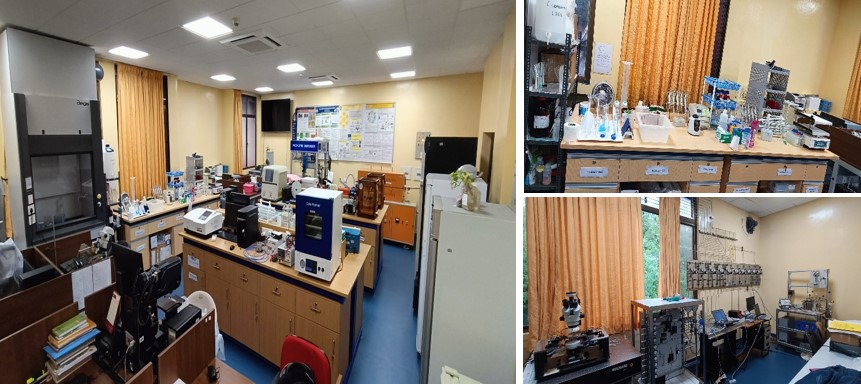
The Power Electronics and Distributed Energy System Research Laboratory focuses on advancing the state of the art in high-power converter designs, including Dual Active Bridge (DAB) converters, Solid State Transformer and Micro Grid Systems etc. The lab’s work aims to improve the efficiency, reliability, and performance of power conversion systems for applications in renewable energy, electric vehicles, micro grids and high-power industrial systems.
The research work explores:
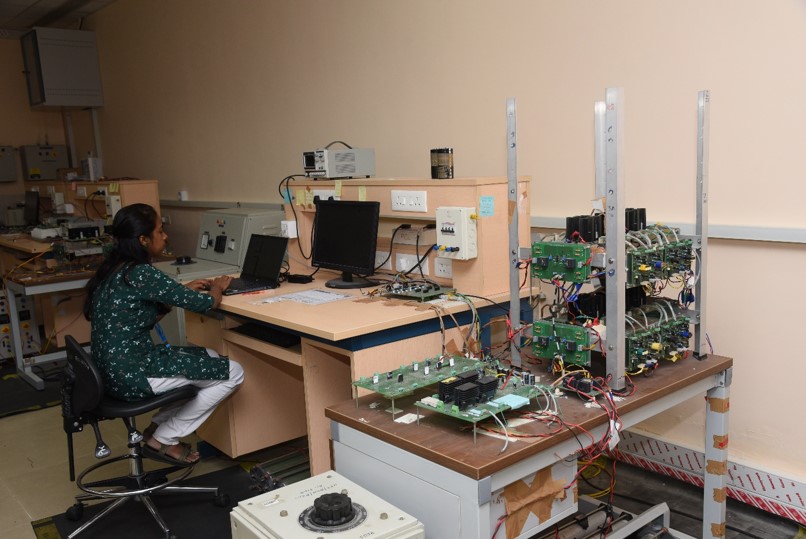
The Power Electronics Laboratory of the Avionics Department is well-equipped for performing basic as well as advanced experiments in Power Electronics and Drives. Equipment and devices required for conducting experiments on open-loop and closed-loop control of AC-DC, DC-DC, DC-AC, and AC-AC converters are available in this laboratory. In addition, facilities are available for performing advanced experiments on DC drives, 3-phase AC drives, multiphase AC drives (split phase and 5-phase), photovoltaic systems, solid-state transformers, microgrids, and more. The control schemes are implemented in custom-built digital platforms such as FPGAs, Digital Signal Controllers, and Microcontrollers.
Some of the equipment includes:
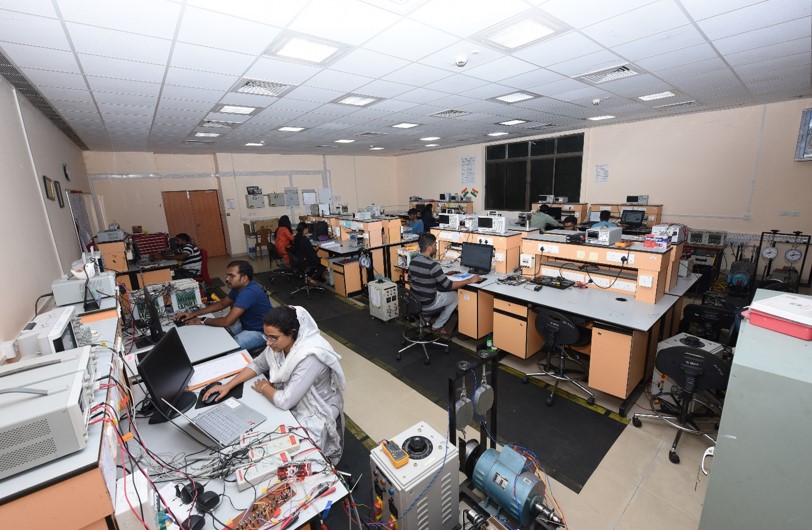
This lab houses advanced digital controllers and processing platforms to control power converters. The lab contains a full spectrum of digital controllers, including ARM-based microcontrollers, custom-made FPGAs, and custom Digital signal controller boards specifically adapted for power electronics and advanced converter applications. The systems developed here can interfacing with high-performance converters such as multi-level converters, multi-phase converters for motor drives, grid-connected converters, and high frequency AC link converters. The lab is also used as an instruction lab for M.Tech Power Electronics and M.Tech Control System programs. This laboratory is equipped with state-of-the-art digital controllers and processing platforms designed for precise control of power converters. It features a comprehensive array of digital controllers, including ARM-based microcontrollers, custom FPGAs, and specialized digital signal controller boards tailored for power electronics and advanced converter applications. Our systems are capable of interfacing seamlessly with high-performance converters, such as multi-level converters, multi-phase converters for motor drives, grid-connected converters, and high-frequency AC link converters. Additionally, the lab serves as an instructional facility for M.Tech programs in Power Electronics and Control Systems.
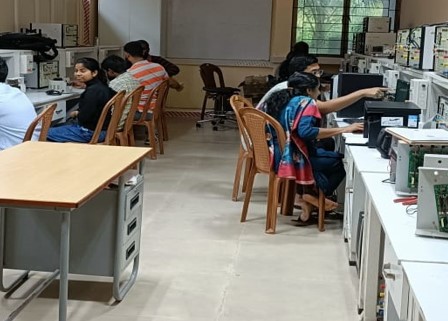
Research in the area of Microsystems/Microelectronics (Semiconductor device and technology) demands good in-house design, fabrication and characterization labs. The following three major laboratories for design, fabrication and characterization with funding from IIST as well through sponsored research projects have been established. With this our PG and research students could get hands –on experience in device development.
These research labs have helped in supporting an R&D ecosystem in Microelectromechanical Systems (MEMS)/ Micro/Nano electronics and sensors at IIST.
In addition to collaborations with academia, we also have collaborations with ISRO centres like IISU, SCL etc. IIST is one of the “Collaborating institutes” with CeNSE IISc for MeitY’s INUP Idea to Innovation program.
The laboratories and research facilities would eventually evolve to an R&D Centre for NEMS & Opto/Nanoelectronics (NEMO) to promote research and technology development activities in the following area.
1. NEMS & Microelectronics Characterization and Sensor Systems Laboratories
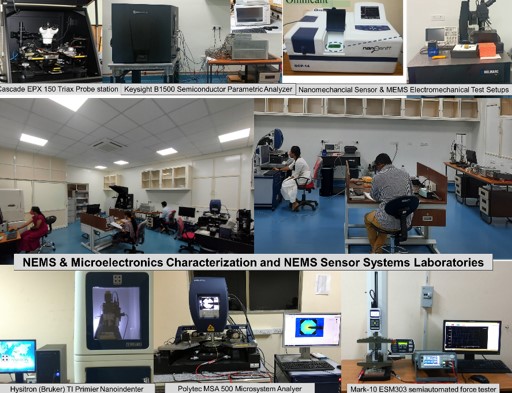
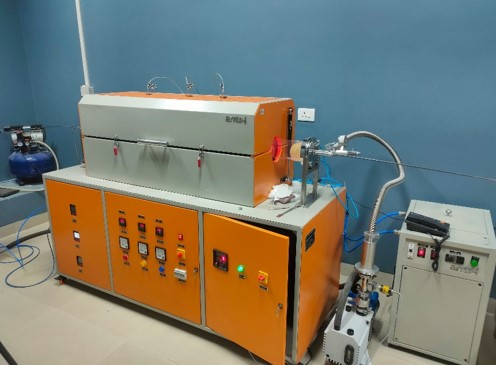
2. VLSI & Microsystems Design Lab
Microsystems design facility is equipped with modelling, design and simulation tools for MEMS devices, Micro/Nanoelectronics devices and systems. (High end workstations, Coventorware and MEMS+ from Coventor, Sentaures TCAD 3D Process and Device TCAD from Synopsis, COMSOL Multiphysics etc.)
3. MEMS an NanoFAB (Microfabrication laboratory)-Phase I
MEMS/Micro/nanofabrication facility is for 4” silicon wafer substrates with upgradability for 6” wafers. Phase-1 of MEMS & NanoFAB has been established with the major equipment’s for MEMS and microfabrication processes with funding support from institute and research projects. Deposition tools-DC/RF/Pulse DC sputtering, ICPCVD, Parylene CVD Photolithography-Double Side Mask aligner, Oxygen Plasma RIE, Anneal Tools-2D material anneal furnace, vacuum anneal etc., and Class-1000 cleanroom are part of this Phase -I
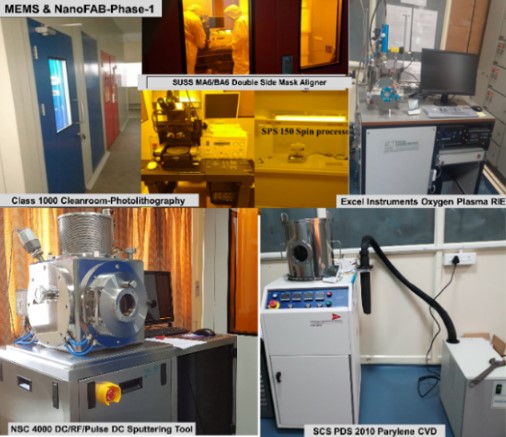
Advanced Microwave Laboratory is a research lab mainly for MTech and PhD students in a wide area of reconfigurable & multifunctional antennas, satellite/ground station antennas, metamaterial/ metasurface-inspired antennas, antennas for smart phone/cellular communications, radar antennas, wireless power transfer, and energy harvesting, etc. The lab provides testing facilities for the fabricated antennas using Vector Network Analyzer (VNA), Spectrum analyzers, as well as an anechoic chamber for measurement purposes.
Advanced Microwave Lab provides facilities such as:
Measurement Setup:
An anechoic chamber is a shielded space designed and constructed to resist electromagnetic waves and suppress the emission of electromagnetic waves to the outside world. An anechoic chamber is shielded entirely with metal and has radio wave absorbers covering the surrounding walls, ceiling, and floor. The size of the anechoic chamber and type of radio wave absorber to be used are determined by the size and purpose of the electronic equipment, wireless devices, or communication system being evaluated. RF and Microwave Pyramidal Foam absorbers are made of carbon-impregnated low-density polyurethane foam and come in various sizes and colors. The tapered structure of the pyramids transitions the radio waves from the air to the lossy carbon employed in the pyramids with minimal wave reflection.
The following measurements can be made with the setup:
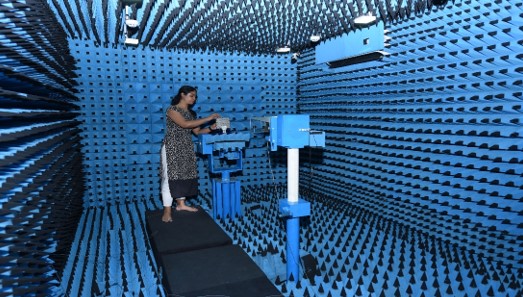
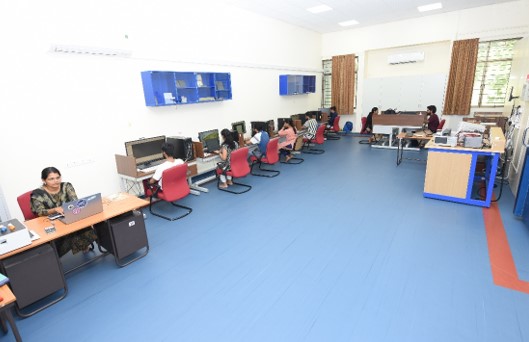
Established in 2022, the Optoelectronics and Photonics Lab of the Avionics Department specializes in advanced optical communication experiments. Our focus is on high-speed data transmission using a 1550nm wavelength laser. Our research includes the fabrication and testing of various optical components, such as PIN modulators, Mach-Zehnder modulators, beam steering devices, tunable MMI splitters, and the design of highly efficient nanocone solar cells. Notably, the beam steering device developed in our lab is the first of its kind to steer a single wavelength laser along a two-dimensional axis. Our modulators can modulate up to 23 Gbps of message signals.
Our lab is equipped with a C-band tunable laser source, an IR camera, an EDFA, photodetectors, CMOS cameras, and other essential instruments. We utilize advanced software tools such as Ansys Lumerical and Tcad Sentaurus to design semiconductor devices. Our experimental setup for optical communication experiments is built in-house, and semiconductor optical devices are designed using Lumerical and Sentaurus software and fabricated either in our clean room or through the INUP facilities available across India.
To date, we have published four international journal papers, with two more currently under peer review. As we strive to become a premier lab for optical communication experiments, we are in the final stages of acquiring an Optical Spectrum Analyzer and a high-frequency oscillator to conduct most of our experiments within the lab itself.
